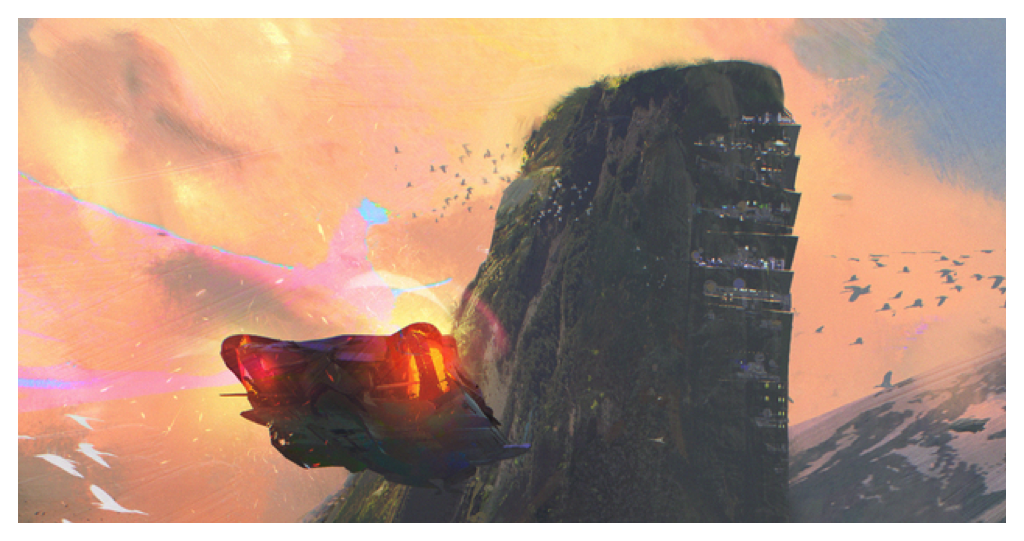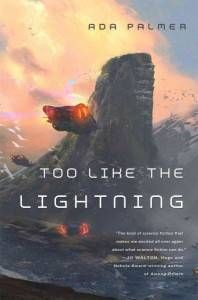
Watershed Novels and Loving TOO LIKE THE LIGHTNING

It’s weird to find a book you can hang such a large lantern on, to point to it and say, “This was where everything took a turn.” But being older now, and a better, more aware reader, I know Too Like The Lightning for what it is.
Picture our world in the year 2454. What does it look like? What’s changed? What’s the same? Are we still us? Are we still humans? Are we better? According to Ada Palmer, sort of and not at all. See, Earth in the year 2454 has gone through a lot of changes, and in many senses of the word, the world order has been irrevocably transformed. There are no more churches. There are no more nations. There are no more families, at least of the nuclear variety. Now, there are sensayers, people trained to work with individuals one on one, to best find the religion and way of life best for them. Now there are Hives, philosophies given shape in the form of nations. Now there are bash’es, large units made up of friends and blood relations, living together in peace and comfort, united under a Hive. Ada Palmer has extrapolated a future in which everything has changed except for our need to be loved, our fear of failure and pain, and our triumph in accomplishing the impossible. It is only the style of those things that have changed.
Our hero, for lack of a better term, is Mycroft Canner. He is a servicer, a criminal dedicated to a life of service for what he’s done, and also the narrator of this story. It is in keeping with the voice of this new world that the language of his narration is baroque and colorful, and riddled with asides of all colors and shapes and sizes, taking time to explain the religions, gender structures, social architectures, and knowledge of his world. It is in keeping that he speaks this way for you see, Earth of the future has stolen inspiration for the philosophies and teachers of the past. Descartes, Hume, Locke, de Sade, Socrates, Plato, and more: the great thinkers of times long gone are now the builders of the future, and Mycroft, as well as everyone of 2454, does their best to live in such large shadows.
There is a plot to Too Like The Lightning, but it is a plot resembling a sun: bright, chaotic, brilliant, massive, and at times even overwhelming, and hard to parse. The book follows the narration of Mycroft as he works in service to others, recounting the events of this particular time and place and year: a global conspiracy, a child with immense and peculiar abilities, hidden legacies, domineering and dangerous servants in service to cryptic yet powerful sons, a young idealist confronting the grey moralities of the world, and throughout it all, the shadow of Mycroft Canner, and the sins that sent him to service. Make no mistake: this is a dense book.
When I first started reading it, and began to sink my teeth in Mycroft’s classical language, the way he described Earth in 2454 with the same style as a philosopher of 1890 may describe London or Berlin or Manhattan, I couldn’t help but wonder: can this be sustained? Will this throw me off? Is the language too rich for me to really understand the novel? And it took quite a while to really find my pace with this novel, but it is absolutely worth it. I’m a sucker for books that strike the perfect balance of working for the audience, and making them work, and I found it here. Every page introduced concepts and ideas that made me stop and think. Every chapter brought a new layer of complication and empathy to a story already brimming with it. Every time I closed the book, I yearned to open it again. I hadn’t read anything like this ever before, and I’m still wondering how the heck Ada Palmer pulled it all off. Though, we all know the answer: she worked herself to the bone to create this beautiful, complicated, dense, rich future, and I am still in awe over how well it all meshes together.
This is not an easy novel. But it is beautiful, and challenges many conventions about writing that I didn’t even know could be challenged or changed. It has absolutely changed the way I read, and the way I’ll look at books. Should you pick it up, know that you have time on your side; do not try to devour it. Take each page as it is, and do not try to rush through this world.
The next book in the sequence is out next February, and I’m already craving my return to the world of 2454. Because as much as things have changed, many things are still the same, and I can’t wait to see these wonderful, noble, brutal humans of the future continue to do their best to live up to their past.








